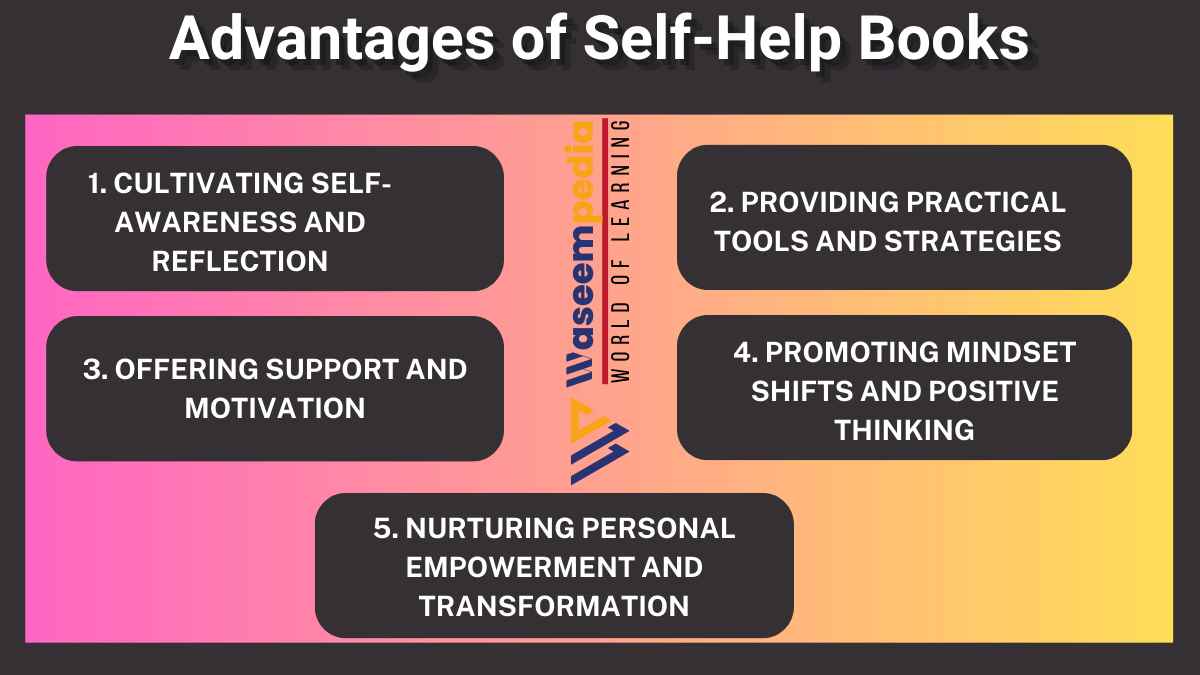Self-help books offer a wealth of advantages, nurturing personal growth, and transformation. They cultivate self-awareness, provide practical tools and strategies, offer support and motivation, promote positive thinking, and empower individuals to take control of their lives.
So, embark on a journey of self-discovery and personal development by immersing yourself in the pages of self-help books, and unlock the keys to unlocking your true potential.
Self-help books have become a popular genre, offering guidance, inspiration, and practical advice for individuals seeking personal growth and self-improvement. These books empower readers to take control of their lives, overcome challenges, and strive for personal transformation.
In this article, we will read the advantages of reading self-help books, highlighting how they foster self-awareness, provide valuable tools and strategies, and support individuals on their journey towards self-fulfillment.
5 Advantages of Self-Help Books
5 Advantages of Self-Help Books are as following.
1. Cultivating Self-Awareness and Reflection
One of the primary advantages of self-help books is their ability to cultivate self-awareness and promote reflection. These books encourage readers to explore their thoughts, emotions, and behaviors, guiding them on a journey of self-discovery.
By providing insights into various aspects of personal development, self-help books prompt readers to examine their values, strengths, and areas for growth. This process of self-reflection enhances self-awareness, enabling individuals to make conscious choices and align their actions with their true selves.
2. Providing Practical Tools and Strategies
Self-help books offer practical tools and strategies that individuals can implement in their daily lives. From time management techniques to communication skills, from stress management to goal setting, these books equip readers with actionable steps to improve various areas of their lives.
Self-help authors often draw from research, personal experiences, and expert advice to provide readers with a comprehensive toolkit for personal growth. By applying the principles and exercises outlined in self-help books, individuals can make tangible progress towards their goals and lead more fulfilling lives.
3. Offering Support and Motivation
Self-help books serve as a source of support and motivation for individuals facing challenges or seeking personal transformation. They provide reassurance that others have gone through similar experiences and offer guidance on how to navigate difficult situations.
These books often share inspiring stories of resilience, perseverance, and triumph, providing readers with the motivation to overcome obstacles and pursue their aspirations. Self-help authors offer guidance and encouragement, reminding readers of their inherent potential and the power they possess to create positive change in their lives.
4. Promoting Mindset Shifts and Positive Thinking
Self-help books promote mindset shifts and encourage positive thinking. They challenge negative thought patterns, limiting beliefs, and self-defeating behaviors. By presenting alternative perspectives and offering strategies for reframing thoughts, self-help authors empower readers to adopt a growth mindset and develop a more positive outlook on life.
These books emphasize the importance of self-compassion, resilience, and gratitude, guiding readers towards a mindset that fosters personal well-being and success.
5. Nurturing Personal Empowerment and Transformation
Self-help books nurture personal empowerment and support individuals on their journey towards self-transformation. They inspire readers to take ownership of their lives, make intentional choices, and embrace personal responsibility.
By providing guidance on personal development, goal setting, and emotional well-being, self-help books empower individuals to create meaningful change in their lives. These books encourage readers to step out of their comfort zones, embrace their strengths, and unleash their full potential.

